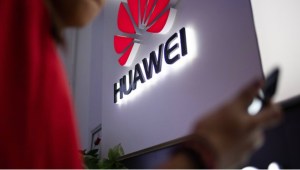A startup set up by a former Huawei executive in Shenzhen has drawn Washington’s attention as it will reportedly supply chips to US-sanctioned Huawei Technologies.
Established in June 2021, Shenzhen Pengxin Micro Integrated Circuit Manufacturing Co Ltd will receive its ordered chip-making machines next year and start producing 28 nanometer (nm) chips in 2025, media reports said.
Bloomberg reported on Thursday that Pengxin Micro, or Pengxinwei in Mandarin, was set up to help Huawei bypass the United States’s sanctions.
Separately, Reuters reported on Tuesday that the Biden administration is going to unveil new measures to restrict Chinese companies from gaining access to the United States’s advanced semiconductor technologies.
In May 2019, the US Commerce Department put Huawei and its 70 affiliates on its “Entity List” on national security grounds. It banned the sales of hardware and software involving US technology to Huawei and its subsidiaries.
In November 2020, Huawei disposed of its entire stake in Honor, its smartphone brand, so that the unit could obtain US chips. Honor is now controlled by the Shenzhen Smart City Technology Development Group, a company owned by the Shenzhen government.
In June last year, the Shenzhen Major Industry Investment Group, also owned by the Shenzhen government, set up Pengxin Micro in the Longgang district. Zhou Jin, a former executive of Huawei, was appointed as the legal representative of Pengxin Micro.
According to its website, Pengxin Micro aims to meet the rising chip demand from the e-vehicle, artificial intelligence and telecommunication sector in the Greater Bay Area in Guangdong province.
The company said it was granted a certificate by the Shenzhen government in April to become one of the most important industrial projects in Shenzhen for 2022.
A Chinese article said in July this year that Zhou, former chief financial officer of Huawei Marine Networks Co Ltd, is currently the chief executive of Pengxin.
Established in 2008, Huawei Marine was 51% owned by Huawei Technologies and 49% owned by Global Marine Group, a United Kingdom-based submarine cable service provider.
In June 2019, Huawei sold its 51% stake in Huawei Marine to the Shanghai-listed Hengtong Group, a Chinese fiber optic cable manufacturer. In return, Huawei became Hengtong’s third largest shareholder in January 2020 after gaining approval from the China Securities Regulatory Commission.
Global Marine Group, in June 2020, sold a 30% stake in Huawei Marine to Hengtong Group, which has since raised its stake to 81%.

However, all these moves failed to prevent Huawei Marine from being added to the Entity List of the US Bureau of Industry and Security (BIS) in August 2020. The company was rebranded as HMN Technologies in November in the same year.
Now Pengxin Micro, which is run by Zhou and owned by the Shenzhen government, has been under the radar of the BIS after media reports said the company would supply chips to Huawei. Huawei declined to comment on the issue.
Meanwhile, Reuters reported that the Biden administration will soon announce new restrictions on China’s access to US semiconductor technology. The White House and Commerce Department declined to comment.
Some Chinese columnists on Tuesday criticized the US government for using its advantages to suppress China’s technological developments and maintain its hegemony.
They said the US sanctions would only hurt the sales of American products and push Chinese firms to boost their research and development (R&D) investments.
The Chinese Foreign Ministry has not yet made any comments due to the National Day holidays during this week.
Read: Huawei’s profits collapse as US sanctions bite
Follow Jeff Pao on Twitter at @jeffpao3

